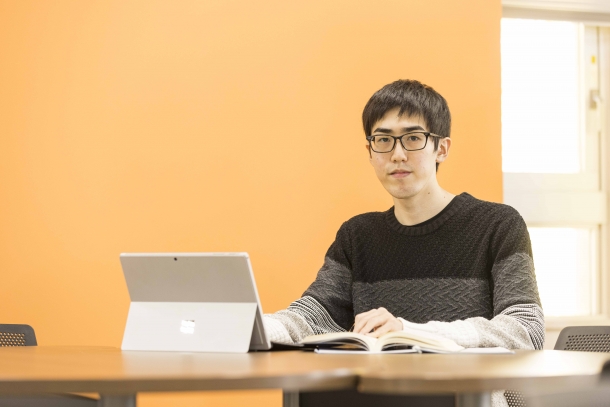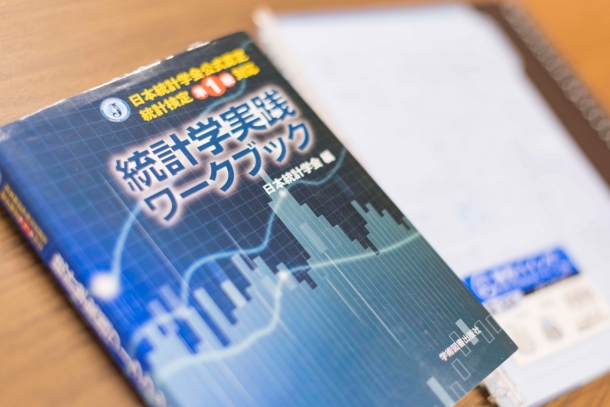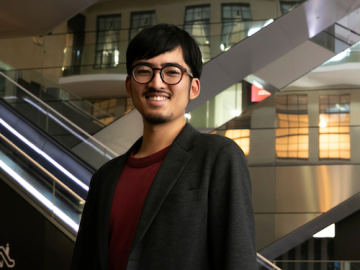Social Science × Data Science

Iori Imai, second year student School of Social Sciences
Studying data science in a broad-based School of Social Sciences department
School of Social Sciences at Waseda University offers a high degree of freedom and allows students to comprehensively study a variety of fields in their classes. I chose School of Social Sciences because I felt it suited me, even though I had not yet decided what I wanted to study at the time of the entrance exam.
I first came into contact with data science when I was preparing for university entrance exams. It was when I read a sociology book I was reading. I remember being interested in how data could be used. After that, even after entering university, I chose classes that taught me data science, and even now I am taking classes that focus on data science.
Since I was in high school, I have liked mathematics, even though I was not good at it, and I wanted to study it in college. Statistical theory requires mathematical knowledge such as probability and differentiation, so I feel that this also met my aspirations.
Learn data science step by step according to grade and time
After enrolling, I was looking for classes related to data science outside of my undergraduate classes, and that's when I found the Data Science Education Program. I also worked to get certified in the Certification Program in Data Science, which certifies my data science skills, and I passed the literacy level and earned credits for beginner courses.
In my first year, I took courses such as "Statistical Literacy Alpha and Beta" and "Data Science Practice." In "Statistical Literacy," we learned mainly about the theoretical aspects of statistics. In contrast, in "Data Science Practice," we actually analyzed data ourselves. As the final assignment for the class, I actually went through the process of drawing a scatter plot, applying analytical methods, and interpreting the results, which I felt gave me a clear understanding of what data analysis is.
These classes were on-demand, so it was convenient because I could attend classes at my convenience without being tied down to a timetable. Also, for someone like me who has difficulty understanding what is being said in one go, it was a big advantage to be able to listen to the classes multiple times and take careful notes.

Mr. Imai, who has a long commute to school, is taking on-demand data science education program lectures.
I am taking classes in my free time.
Since I became a second-year student, I have been taking classes such as "Data Science of Time Series Structure" and "Data Science of Causal Structure" and am enrolled in a seminar taught by Professor Tota Suko, the academic director of Center for Data Science. Since I will start research in my third year, I am currently learning the basics of statistical analysis methods before deciding on my research field. I would like to firmly decide on my research field while understanding various analysis methods and solidifying my basics.
Everyday phenomena are consistent with statistical theory
What I find interesting about studying statistics is that you can find theoretical meaning in everyday actions that we take for granted. For example, when you make soup and taste it, you scoop a spoonful from the pot to check the taste. I think everyone intuitively knows that by doing so, you can get a sense of the taste of the soup in the entire pot. In statistical theory, this corresponds to the theory of estimation, which says that if you take a sample from a population and take the average, you can find the average of the population. When you realize that these intuitive everyday actions match the theory, statistics becomes very interesting.
I also recently took the "Statistics Proficiency Test" and solved several years' worth of past questions, and calculated my chances of passing by averaging my scores. I think this is something that everyone does when taking exams, but it's actually based on statistical theory. There are actually a lot of logical things in our everyday actions that we do without even thinking about them. I think I've gotten into the habit of thinking logically in my daily life.

In addition to studying in the data science education program, Imai is also taking the statistical test.
I also work as a data science LA at the Math & Stat Center, answering questions from students and checking content. I sometimes get questions from students who are writing their graduation theses, and I answer difficult questions with the support of my seniors, so while I learn a lot, the frustration I feel also motivates me to study.
I think today's high school students have more opportunities to learn about data utilization and statistical theory in information subjects than I did when I was a student. Waseda does not have a specialized faculty for data science, but it is very convenient that students from any faculty can study data science as a minor through the "Certification Program in Data Science."
Some of you may not have decided on your specific major yet, but data science is a very important and effective method in any academic field, regardless of whether it is humanities or sciences. Therefore, once you have found the research you want to do after entering university, I believe you will be able to use the data science you have learned as an analytical tool for research.
Mathematics may be a barrier for those in the humanities. However, in data science, although knowledge of statistical theory is used, auxiliary tools can also be used in actual analysis. I feel that what is important is not the ability to use mathematics itself, but rather learning the purpose of analysis, interpretation of results, and analytical methods. Therefore, I would like to convey that even those who are not good at mathematics can make use of data if they learn analytical methods.






